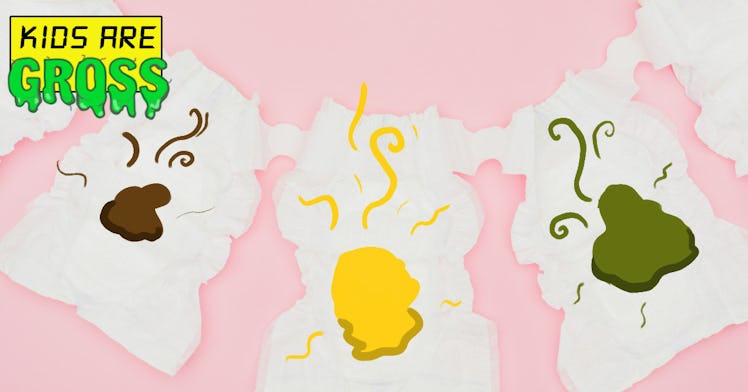The Baby Poop Smell Experiment And What Love Truly Means
Family may inform how bad your baby poop smells, scientists say.

Parents think their kids’ shit doesn’t smell — at least as much as other baby poop — research suggests. And this may be an evolutionary boon. The emotion of disgust evolved to protect people from exposure to disease, researchers suspect, but one must overcome disgust to adequately care for babies. Evolution had a solution: the innate ability to overcome any diarrhea diaper explosion, so long as your own offspring is the detonator.
“While on the one hand the disgust system seems to act like super sensitive alarm, it also has to be flexible so as not to impede essential activities like sex, maintaining our own hygiene, and caring for family,” Trevor Case, an evolutionary psychologist who authored the original study demonstrating this among mothers, told Fatherly.
“This is a very robust effect—just ask any mother and they’ll likely say that they prefer their own baby’s diaper.”
Although a large body of research demonstrates that disgust is a behavioral adaptation meant to guard humans against infection, there’s evidence that that the disgust response could have the tempered effects when it comes to familial relationships. To test this, Case and colleagues surveyed a small sample of 42 mothers about the level of disgust they felt the last time they changed their babies’ diapers. Then they were asked if they had ever changed another baby’s diapers that weren’t their child, and rated how repulsed they were. Mothers consistently rated their own infant’s feces as less disgusting than that of other infants.
But this was all in theory. So researchers collected dirty diapers and labeled them—some correctly, with the name of each child attached to its output, and some incorrectly. They then asked the mothers to sniff. Again, moms rated their own children’s diapers as least unpleasant, even when the labels told them that they were smelling foreign poop, and even when there were no labels at all. It seems a mother just knows.
Although he did not study fathers, Case suspects the findings apply to involved dads. “It should hold for fathers who do a lot of diaper changing, but probably not for those who shirk their diaper-changing responsibilities.”
Case and colleagues concluded that it was largely an issue of nurture rather than nature—more exposure to your own baby’s poop trains your nose to accept it as safe or, at least, a necessary evil. But Kara C. Hoover, a bioanthropologist who studies the evolution human olfactory variation and prehistoric human health and diet, suspects nature itself may play a role. While Hoover was not involved in the smelly diaper experiment, she notes that the animal research shows that many mammals who mark with their feces can recognize the difference between that and their own, even at first sniff. The current thinking is that we can identify chemical signatures in our poop, and the poop of our family members, and that this is an only somewhat learned behavior.
Both nature and nurture likely play a role. “It makes sense that humans might be able to pick up specific odor cues in feces that signify some sort of relationship,” Hoover told Fatherly. “It might be habituation, and some sort of chemical signal that shows kin, and maybe there’s an emotional component to that.”
Despite the fact that the effects of habituation have been replicated across many smell studies without baby poop, Case concedes that this possible chemical signature for families has not been studied and cannot rule out biology completely. “The important thing is that the main phenomenon under investigation has been replicated,” Case says. “I don’t know of any other study that has specifically tested mothers and soiled diapers,”
“Or who would want to!”
This article was originally published on